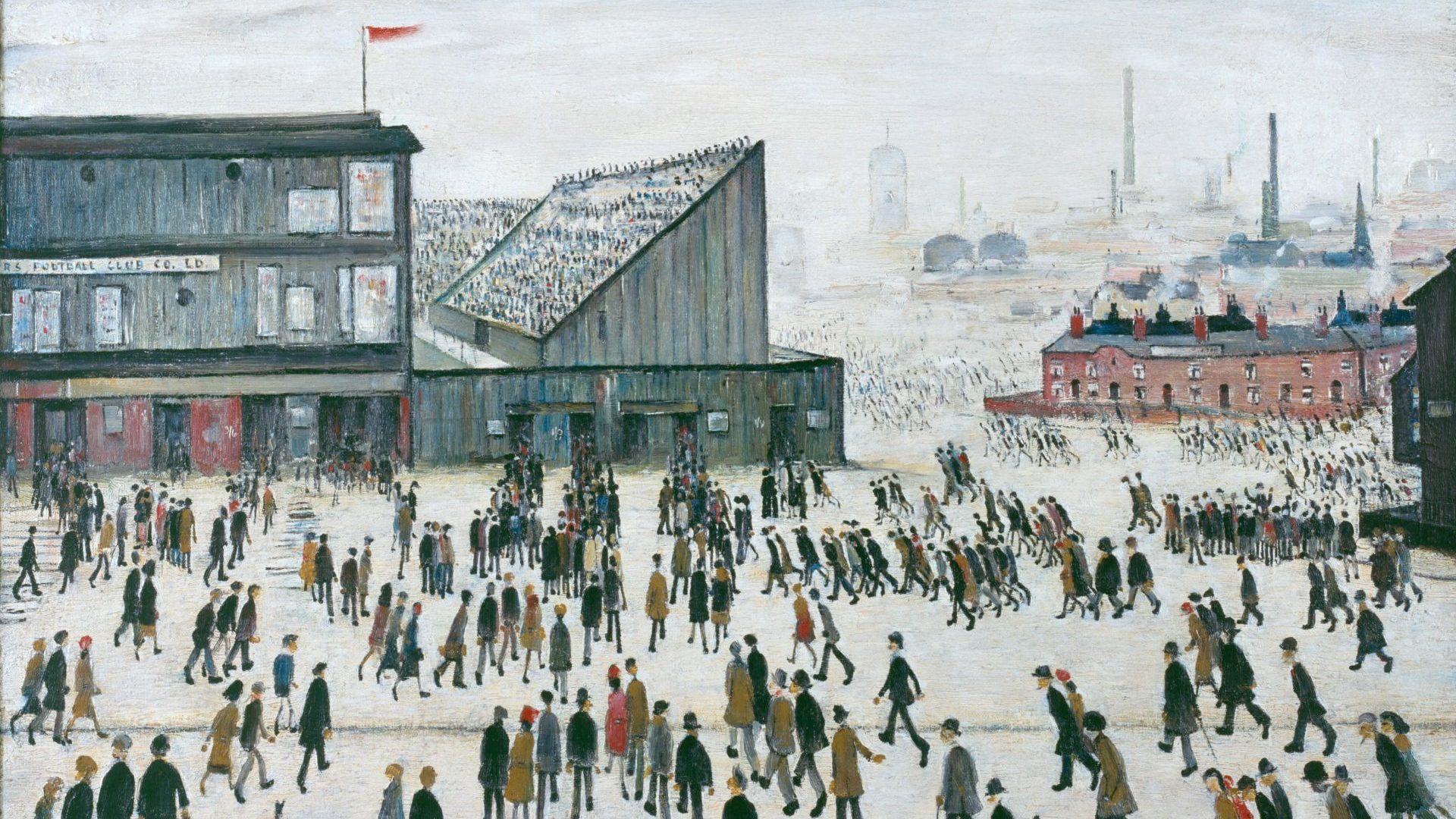Hanging above my desk is a print of LS Lowry’s 1953 painting Going to the Match. It depicts the outside of a football stadium on a matchday with people making their way towards the turnstiles in groups, pairs and those just going alone. It’s a brilliant combination of community and ritual, local pride and escape from the drudgery of everyday life, but unlike most crowd scenes in art, he makes every figure an individual.
Although painted simply in characteristic Lowry style, each figure is the gateway to a life. Even those walking as part of a group seem alone and I like to wonder what they are thinking about. Fish and chips on the way home? Will that war pension ever turn up? Is dad’s cough getting worse? Will that useless lummox still be at left-half today after last week’s shambles?
The figures in Going to the Match are united by the hope their team will win, but as captured by Lowry they are singular people at the centre of their own singular story, each containing their hopes, fears, dreams, passions and disappointments, reminding us that we are all unique and remarkable in our own ways.
Literature has always been focused on extraordinary people at the heart of extraordinary events. From Beowulf to the latest bestselling thriller, literary stories have been designed to lead us away from the routines, drudgeries and disappointments of our everyday lives and into an imagined world where remarkable things happen.
Routines, drudgeries and disappointments have never been the stuff of great literary invention because who wants to read a novel about roundabouts, rail replacement buses and trying to find an NHS dentist?
The answer to that, at least if a recent and growing strain of literature is anything to go by, is: more people than you might think.
It could be a reaction to how the real world has been spinning increasingly out of control in recent years, but there is a gentler form of literature growing in popularity. The horrifyingly fantastical and startlingly farcical have become so commonplace there is a discernible trend for novels that eschew the remarkable in favour of the everyday. Instead of leading us from the ordinary into the extraordinary these books take us in the other direction. They are gentle in tone, their protagonists on the edge of things, vulnerable, lonely, marginalised, people whose stories are underpinned by warmth and riddled with that concept deeply unfashionable in the modern world: kindness.
Perhaps unsurprisingly, at least if the “antidote to the craziness” theory holds water, this genre can be traced back to 2016 and arguably began with No-One Cares About Your New Thing, a poetry collection by the Norwich-based writer John Osborne (Go Faster Stripe, £10). Taking as his inspiration the in-between moments of life, Osborne notices beauty in the mundane and expresses it with a deep and gentle warmth in poems with titles like Those Are Big Houses, Looking After a Bloke’s Bag in the Pub and Ex-Pupil Visits Old School. There is genuine profundity in his deceptively simple verse, such as in There Is Handholding Still:
My friend’s grandparents married
three weeks after they first met.
Their third date was a pub Sunday roast,
walking her back home he proposed.
Two eighteen-year-olds saying
“I’ve got a good feeling about this”.
I think about them when I need reminding
sometimes we have to take risks.
In the wake of the Brexit vote and Trump’s election, Osborne’s slim volume was a welcome oasis of calm and a valuable reminder that there is still goodness to be found in the world.
2017 saw the publication of Gail Honeyman’s enormous bestseller Eleanor Oliphant Is Completely Fine (HarperCollins, £9.99) whose protagonist starts out as a loner living on supermarket pizzas and vodka drunk from a coffee mug, but through a series of interactions including a burgeoning affection for a pop star and coming to the aid of an old man who falls in the street, emerges into the world to find her place in it.
The Dublin writer Ronán Hession’s 2019 Leonard and Hungry Paul (Bluemoose, £9.99) helped establish this gentler method of viewing the world. An exploration of the friendship between the eponymous protagonists, two men who have found quiet itineraries through life based on orderliness and routine, Leonard and Hungry Paul is one of the warmest depictions of the best of humanity I have ever read, a book I loved so much that when an old friend said she hadn’t enjoyed it, for a brief moment I wondered if we could still be friends.
Inevitably the fledgling genre was given a name, and a terrible one at that: up-lit, short for “uplifting literature”. By suggesting authors are setting out just to cheer you up, that these books are light reading, palate-cleansers between works of serious fiction that get properly to grips with the human condition, calling it up-lit does the genre a staggering disservice. To write novels like Leonard and Hungry Paul, explorations of character that travel life’s byways rather than highways and that break many of the accepted rules of writing fiction, takes immense skill as well as a rare faith in the goodness of people.
This summer brings two new outstanding examples of this priceless aspect of our literature. Both chart the lives of men on different sides of the world who have stepped out of the mainstream to build lives that feel safe, their worlds like dens constructed from sofa cushions, each forging a carefully considered path laid entirely on their own terms.
Brian by Jeremy Cooper (Fitzcarraldo Editions, £12.99) looks destined to be a classic of its kind. Originally from Northern Ireland, Brian lives in north London and works for Camden Council. He is a man who finds refuge in routine, having lunch at the same cafe and visiting the same barber at the same intervals, carefully marked ahead on his calendar. There are hints of childhood trauma and spending his adolescence in care, meaning Brian has created his own defences against the world of which his routine is a vital part.
Knowing that “he longed to be included, and dreaded it, equally”, when Brian is nearly 40 he finally finds his passion, the one place where he can feel relaxed and happy to interact with the world on his terms. Brian begins going to the National Film Theatre on the South Bank in London as often as he can.
Sitting in the same seat every night, Brian comes to adore the anonymity of the darkness combined with the enrichment of the events playing out on the screen. We experience his critical faculties growing and the comfort he finds in the guarded bonding with fellow regulars who meet afterwards to discuss the films with occasional awkward forays into friendship beyond the doors of the British Film Institute.
Brian is a wonderfully drawn character and Brian doubles as a love letter to cinema. You will, I guarantee, emerge from Brian’s company with a list of films to watch.
Had they not lived on opposite sides of the globe, one senses that Brian might have forged a bond with Bob Comet, the focus of Patrick DeWitt’s new novel The Librarianist (Bloomsbury, £18.99). Indeed, DeWitt’s description of Bob could equally apply to Brian.
“Like many, like most, he rode the centre line,” he writes, “not going out of his way to perform damage against the undeserving but never arcing toward helping the deserving either.”
At the start of the novel it’s the mid-2000s, Bob is in his early 70s and has just retired after a long and contented career in an Oregon public library. Coming across Chip, a vulnerable elderly woman, in the street, he returns her to the residential care facility where she lives and begins to volunteer there, starting a chain of events that returns him to the circumstances that lie behind a life spent largely alone.
DeWitt, whose The Sisters Brothers was shortlisted for the Booker prize and turned into a film that stayed impressively faithful to the book, is a brilliant storyteller and the skill with which he takes us through key episodes in Bob’s life makes The Librarianist one of his best.
In Bob’s slipstream are tales of broken hearts, betrayals and tragedies that, if they didn’t completely make him, certainly shaped the person he became, a man who “had no friends, per se; his phone did not ring, and he had no family, and if there was a knock on the door it was a solicitor; but this absence didn’t bother him, and he felt no craving for company.”
There doesn’t even seem to have been a great love of literature in Bob’s career choice. Although a voracious reader, there’s no sense of books resonating to the depths Brian finds with film, but it’s the sense of quiet order and gentle routine in the library that makes it the perfect place for a man like Bob. Like the protagonists of this magnificently enriching genre, like Lowry’s crowd going to the match and very much like ourselves, Bob passes largely under the radar, accumulating a sum of experiences, events and circumstances to place him at the centre of his own unique story.
“Ultimately,” writes DeWitt, “it was Bob’s lack of vanity and his natural enjoyment of modest accomplishment that gave him the satisfaction to see him through the decades of his lifetime.”
Nothing sounds more trite than declaring we need more kindness in the world but that doesn’t make it any less true. After all, as John Osborne says in his poem Balancing, we are “All of us trying to cope, all of us terrified, all of us determined we’ll do our best.” There are writers out there who recognise this and are brilliant at showing it back to us.




